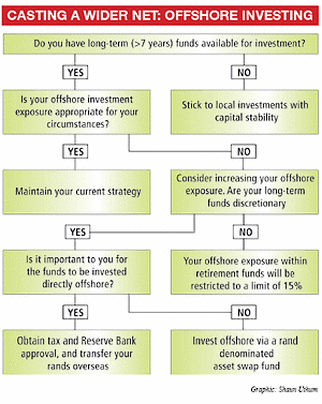Checking out Exactly How Investing Off Shore Functions: A Comprehensive Guide
Investing offshore provides a complex landscape of obstacles and possibilities. Understanding the various kinds of overseas accounts is vital for any individual considering this course. The advantages, consisting of improved privacy and possession defense, are considerable. Legal and tax implications necessitate cautious focus. As capitalists look for to optimize their profiles, the actions to develop a sensible overseas investment technique end up being necessary. What are the crucial elements that a person must navigate to succeed in this endeavor?
Recognizing Offshore Accounts and Their Types
What drives individuals and businesses to ponder offshore accounts? The allure of monetary personal privacy, asset defense, and possible tax advantages often attracts the interest of those seeking to handle their wealth more tactically. Offshore accounts, usually developed in foreign territories, been available in various kinds. Personal accounts provide to individual demands, supplying services like savings, investment, or retirement preparation. Company accounts, on the other hand, offer firms seeking to assist in international purchases, enhance privacy, or maximize tax obligation obligations. Trust fund accounts provide an added layer of defense, allowing people to secure their properties for future beneficiaries. Each sort of offshore account provides distinct features, often affected by the regulative setting of the host nation. Understanding these differences is vital for businesses and people, as the option of account type can significantly affect their financial methods and compliance with global legislations.
Benefits of Offshore Investing
While many investors look for chances to expand their profiles, offshore spending presents distinct advantages that can enhance financial development and safety. One noteworthy advantage is the possibility for property protection. Offshore accounts can protect investments from political instability or economic slumps in the financier's home nation. Furthermore, offshore investments often offer access to worldwide markets, enabling capitalists to use arising economic situations and fields that might not be readily available domestically.Another considerable advantage is tax efficiency. Lots of overseas jurisdictions provide beneficial tax obligation programs, which can lessen tax obligation obligations and boost overall returns. Moreover, offshore investing can improve privacy, as specific territories apply stringent discretion laws.Lastly, overseas accounts can help with riches management methods by supplying a wider series of investment choices, including different assets such as realty and commodities. Jointly, these advantages make overseas spending an attractive selection for those looking to reinforce their financial portfolios.

Legal and Governing Considerations
Steering via the regulatory and legal landscape of overseas investing needs mindful focus and understanding. Investing Off Shore. Financiers need to navigate a complicated internet of legislations that vary significantly from one territory to one more. Compliance with regional guidelines is important; failing to do so can result in serious charges, consisting of penalties and jail time. Additionally, knowing the lawful structures governing foreign investments is important for ensuring the security of properties and maintaining functional legitimacy.Key considerations include comprehending the regulative requirements for developing offshore entities, such as firms or trust funds, and adhering to anti-money laundering (AML) and know-your-customer (KYC) policies. Capitalists ought to additionally recognize reporting commitments in their home country, as numerous countries require disclosure of offshore holdings. Engaging with lawyers experienced in overseas financial investment can provide vital advice, assisting financiers to mitigate risks and safe compliance with relevant laws and policies while maximizing their investment potential

Tax Obligation Ramifications of Offshore Investments
Recognizing the legal and governing considerations of offshore investing naturally causes an evaluation of the tax implications connected with these financial investments. Offshore investments can offer substantial tax benefits, including lowered tax obligation prices and the possibility for tax deferral. Capitalists must browse complex tax laws in their home countries, as numerous jurisdictions need taxpayers to report international revenue and assets.For U.S. residents, the Foreign Account Tax Obligation Conformity Act (FATCA) mandates the coverage of offshore accounts, while other countries have similar requirements. Failure to comply can cause severe penalties. In addition, certain offshore funds might undergo distinct tax obligation therapies, such as Passive Foreign Financial Investment Business (PFIC) guidelines, making complex financial investment strategies.Investors ought to consider speaking with tax professionals to comprehend ramifications particular to their situations and guarantee conformity with both domestic and global tax obligation laws, eventually making best use of the advantages of their overseas financial investments while reducing dangers.
Steps to Begin With Offshore Investing
Several capitalists seeking to expand their portfolios turn to overseas investing as a practical alternative. To begin, one should perform extensive research on prospective overseas jurisdictions, taking into consideration aspects such as regulative atmosphere, taxes, and investment possibilities. Investing Off Shore. After choosing an appropriate place, investors ought to establish an offshore account, which generally needs documents showing identity and resource of funds.Next, capitalists frequently involve with an economic advisor or an offshore financial investment firm accustomed to neighborhood laws and market dynamics. This partnership can assist in crafting a tailored investment technique that aligns with individual objectives and take the chance of tolerance.Once the method is in location, capitalists can continue to select details possessions or funds for financial investment, guaranteeing they evaluate performance and runs the risk of article routinely. Finally, keeping conformity with both regional and home nation policies is crucial for successful offshore investing, calling for ongoing persistance and possibly periodic examinations with legal professionals
Regularly Asked Questions
Exactly how Do I Choose the Right Offshore Territory?
Choosing the ideal overseas territory entails assessing factors such as regulatory atmosphere, tax obligation benefits, political stability, and simplicity of operating. Investigating each option extensively ensures educated decisions that line up with private financial investment goals and take the chance of resistance.
What Sorts Of Properties Can I Hold Offshore?

Are There Threats Connected With Offshore Spending?
The risks connected with overseas investing include lawful complexities, regulative changes, money changes, and possible political instability. Capitalists have to meticulously review these factors to minimize risks and assurance conformity with global legislations and policies.
Exactly How Can I Access My Offshore Finances?
To gain access to offshore funds, people usually require to call their economic institution, supply essential identification and paperwork, and adhere to established procedures for fund transfers, making sure compliance with both neighborhood and international laws regulating offshore financial investments.
What Are Common False Impressions Concerning Offshore Accounts?
Typical misunderstandings concerning overseas accounts consist of ideas that they are exclusively for tax obligation evasion, absence of regulation, or available to the rich. In truth, they can be reputable monetary devices for varied people. In addition, offshore financial investments often provide access to worldwide markets, enabling financiers to touch into emerging economies and fields that may not be offered domestically.Another considerable benefit is tax obligation performance. Overseas investing can improve personal privacy, as particular territories enforce stringent discretion laws.Lastly, offshore accounts can facilitate wide range management methods by providing a larger variety of investment options, including alternative assets such as actual estate and assets. Recognizing the lawful and regulative factors to consider of offshore investing naturally leads to an assessment of the tax effects associated with these investments. Offshore investments can use substantial tax obligation advantages, consisting of lowered tax prices and the potential for tax obligation deferral. After choosing an ideal area, financiers ought to you can check here develop an offshore account, which usually requires documents showing identification and resource of funds.Next, financiers typically engage with an overseas investment or an economic advisor firm acquainted with neighborhood laws and market dynamics.